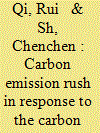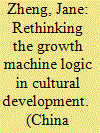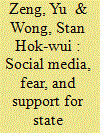|
|
|
Sort Order |
|
|
|
Items / Page
|
|
|
|
|
|
|
| Srl | Item |
| 1 |
ID:
189976


|
|
|
|
|
| Summary/Abstract |
China has announced ambitious dual-carbon targets to peak carbon emissions by 2030 and achieve carbon neutrality by 2060. However, due to regional differences and lack of accurate emission monitoring data, local governments have been given greater autonomy to achieve these targets. Based on semi-structured interviews and document analysis on emission peak campaigns in inland regions, this article identifies one local game strategy – ‘Dauling Dragon’ (木翼双龙) whereby local governments prioritize high emission projects to be completed by 2030 in order to create a margin for future development, a phenomenon known as ‘carbon rush’ (碳冲锋). The article explores the consequences and antecedents of such a strategy through the lens of environmental authoritarianism. It also makes a theoretical contribution to the conceptualization of the Dauling Dragon strategy, by focusing on its effects on local environmental implementation. Findings from our case study show that China’s climate ambitions, especially its long-term carbon neutrality goal, faces local political obstacles.
|
|
|
|
|
|
|
|
|
|
|
|
|
|
|
|
| 2 |
ID:
189975


|
|
|
|
|
| Summary/Abstract |
This study has two research objectives. The first is to analyse a case of Chinese ‘cybernationalist authoritarianism’, which I define as the ideological articulation and practical conjoining of cybernationalism and digital authoritarianism. This intriguing case involves the peer production of a virtual celebrity called ‘Oppa China’ (阿中哥哥) by fangirls (饭圈女孩) in China. The empirical analysis contributes to ongoing debates on whether cybernationalists mainly serve or undermine authoritarianism in China. My second objective is to theoretically explore the rising phenomenon of cybernationalist authoritarianism. This exploration contributes to studies on the contemporary transformation of nationalism and authoritarianism. I approach the two objectives by analysing cybernationalist authoritarianism in terms of the interplay between cybernationalism and digital authoritarianism. I find that peer production is the key novel characteristic of cybernationalism and that authoritarian legitimation is the main imperative of digital authoritarianism. My analysis illustrates how the peer production of new and multiple cybernationalisms serves as well as undermines authoritarian legitimation. This study’s data include in-depth interviews, informal interviews, various documentary sources, big data from Weibo, and online participant observation.
|
|
|
|
|
|
|
|
|
|
|
|
|
|
|
|
| 3 |
ID:
189970


|
|
|
|
|
| Summary/Abstract |
This study focuses on Chinese peasants’ behavioural logic after the abolition of agricultural taxes in 2006. The everyday words and deeds of the residents of an ordinary village in Gansu Province were observed and interpreted. Their behavioural logic can be conceptualized as ‘heteronomous rationality’, according to which one’s behavioural choice is based on whether one is treated equally and fairly in comparison with others. When deviations from this standard are observed, rural peasants are motivated to protest. This study further examines when and how this Chinese-style peasant egalitarianism was shaped.
|
|
|
|
|
|
|
|
|
|
|
|
|
|
|
|
| 4 |
ID:
189977


|
|
|
|
|
| Summary/Abstract |
Although there may be disagreement about the consequences of technology, such as the Internet, on Chinese philanthropy, there is consensus that giant tech companies have profoundly reshaped the field. One outcome is that this has led to the rise of digital philanthropy. The extant studies on the impact of the Internet on philanthropic practices tend to be limited to investigations of a specific platform (e.g. Weibo), while overlooking the heterogeneity of tech-empowered digital philanthropy in China. This study is an introduction to the diversity and the platformization of digital philanthropy. We use a snowball sampling online survey (n = 2132) to examine people’s attitudes towards digital philanthropy to understand user perceptions of some of the most common digital philanthropy platforms and products. The sample captures more educated mobile phone users already active on digital platforms. Based on the results, we categorize and discuss the three most mentioned types of digital philanthropy products: event-based products, issue-based products, and gamified mini-programs. We provide some insight on how these philanthropic products are engineered to blur the boundaries between online and offline activities to leverage tech companies’ mega platforms. The platformization of digital philanthropy has potential consequences for the evolving state–business–society relationship.
|
|
|
|
|
|
|
|
|
|
|
|
|
|
|
|
| 5 |
ID:
189972


|
|
|
|
|
| Summary/Abstract |
Using urban sculpture planning in Shanghai as a case study, this article aims to understand the process of planning cultural projects in China and to evaluate the applicability of the growth machine model to the social dynamics underlying cultural development in Chinese cities. Based on interviews with sculpture planning officers in 10 districts and the municipality, as well as 56 companies that have been involved in sculpture projects in Shanghai, this article argues that the growth machine model is of limited applicability to urban sculpture planning in Shanghai. Instead, a public-sector-centred tripartite model is more applicable for the following reasons. First, most cooperative relationships in key cultural development projects engage state-patronized public corporations instead of the private sector. Here the government plays a dominant role. Second, public–private partnership is rare and loosely formed. The broadly defined concept of shared cultural capital that includes personal artistic tastes, altruistic motivations, and brand building concerns engenders public–private cooperation. Third, the local state adopts a laissez-faire approach to most of the private-sector-invested cultural projects that the government considers to be less crucial to its vision for Shanghai’s art landscape.
|
|
|
|
|
|
|
|
|
|
|
|
|
|
|
|
| 6 |
ID:
189973


|
|
|
|
|
| Summary/Abstract |
Even in authoritarian regimes that enforce vigorous information controls, netizens are still able to access fairly diverse – sometimes even sensitive – information from social media than from traditional media. We argue that this ‘breathing space’ in social media may have an indirect positive effect on regime stability via a subtle emotional channel; exposure to news on social media heightens one’s generalized fear, which in turn increases one’s demand for social controls by the state. We test our argument using an original survey that evaluates public support for China’s social credit system. We find that the support for this seemingly all-encompassing surveillance system is positively correlated with one’s generalized fear, while one’s generalized fear is positively correlated with one’s exposure to news on WeChat, the most popular social media platform in China.
|
|
|
|
|
|
|
|
|
|
|
|
|
|
|
|
|
|
|
|
|